The Inner Workings of a Workaholic

More Americans than ever are letting their vacation days go by the wayside — not because they want to, but because they’re afraid to spend too much time away from their jobs. For fear that they might fall behind, be replaced or be seen as slackers, more than half of Americans aren’t taking more than one week away each year.
Considering Americans take fewer vacations than other developed countries, work longer hours and even retire at an older age on average, it’s not uncommon for many people to be classified as workaholics. But what does this really mean? We surveyed more than 1,000 Americans to find out how they classify their work ethic, which behaviors make them workaholics and whether that’s really such a bad thing. Continue reading see what we uncovered.
Nose to the Grindstone
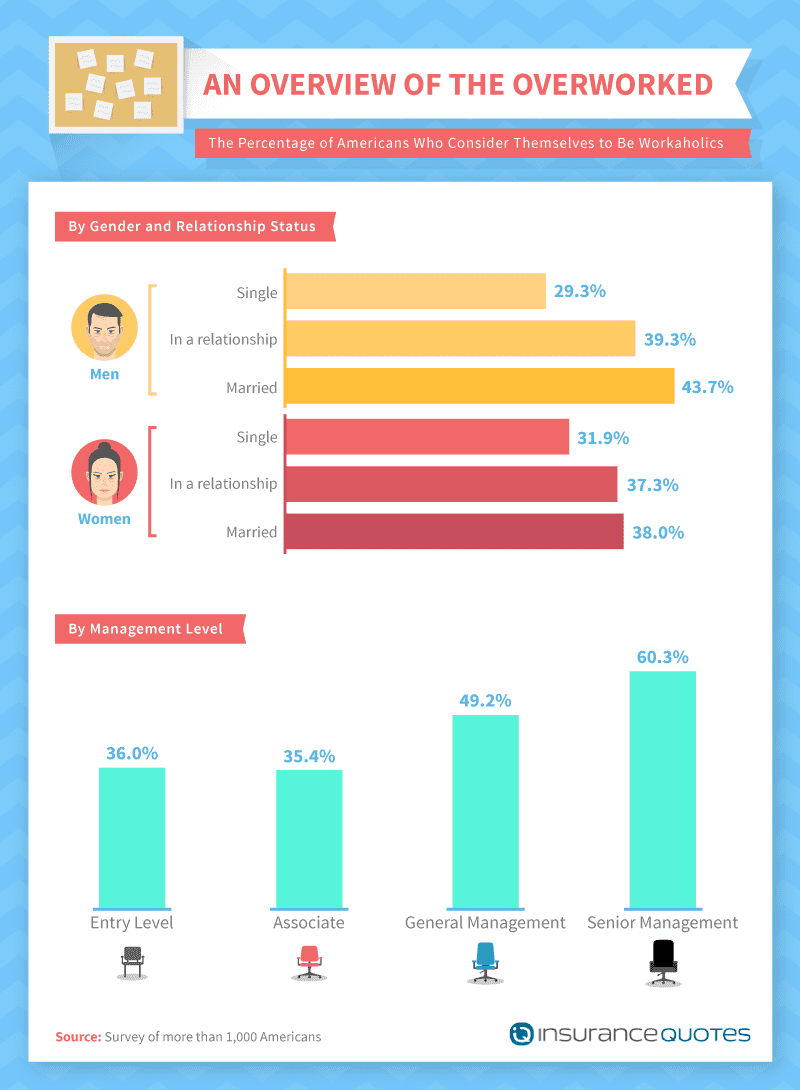
Whatever the definition, when asked how often or how hard they worked, a significant portion of men and women considered themselves workaholics.
While some studies have shown single Americans may benefit from their solo time, which can make them more self-reliant and motivated, our survey found single men and women were the least likely to consider themselves workaholics. Perhaps because relationships can be so expensive, or making the jump from a relationship to married costs five figures on average, Americans with significant others were more likely than those going stag to consider themselves overworked.
We also found people with higher company positions were more focused on work than those with entry- or associate-level jobs. Research has shown people with higher paying roles tend to work longer hours than those who earn less, even though their positions are more likely to be salaried than hourly. Americans in senior management were nearly twice as likely to consider themselves workaholics than associate-level employees.
Defining a Workaholic
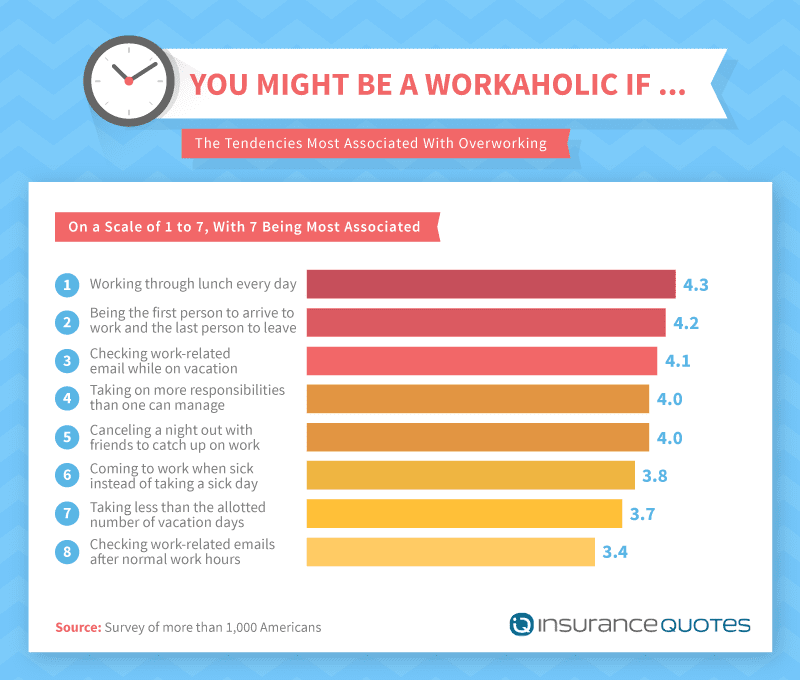
So what does it mean if you consider yourself a workaholic? According to Americans polled, working through lunch was one of the most visible signs they worked too much (or too hard).
While it’s not uncommon for Americans to skip their lunches entirely, or at least work through them, this behavior can be counterproductive when trying to get ahead. If you’re spending too much time in the office, you could be stifling your sense of creativity by working longer hours in the same location. Showing up early to work and staying late at night are also signs you could be considered a workaholic by peers. Americans told us the early bird and night owl were indications that someone might be going above and beyond their standard job requirements.
While checking work-related emails off the clock wasn’t considered as egregious as some other actions, checking work emails on vacation was voted as one of the biggest signs of being overworked. In reality, Americans spend more than six hours a day checking their work email, and half check their inboxes while on vacation.
No Days Off
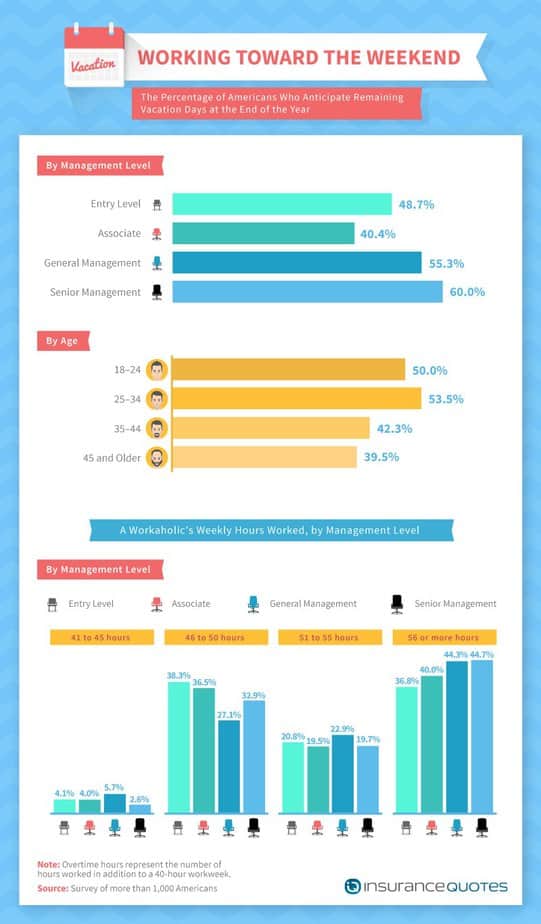
Managing a disastrous social media blunder at work? Stressing about cyber security? Want to feel less stressed, improve your state of mind, or even strengthen your relationship with your significant other? Then you ought to think about taking a vacation, where the extent of your worry might be putting on sunscreen or deciding whether or not to enroll in trip insurance. Despite the numerous benefits of getting away from the office for a while (including feeling less stressed and improving your overall state of mind), many people aren’t taking advantage of one of the best job benefits — paid time off. In 2016, more than half of working Americans left at least some portion of their earned vacation days unused; a total that accumulated to 662 million days of unspent time away.
Our study found that while nearly half of entry-level employees acknowledged leaving at least some of their vacation days unused, more than 55 percent of Americans in general management and 60 percent of senior managers admitted they weren’t taking all of their time off.
While millennials are said to crave experiential travel, including longer and more frequent getaways, more than 53 percent of Americans between the ages of 25 and 34 left paid time off unused, the highest of any working age group.
More Hours, More Stress?
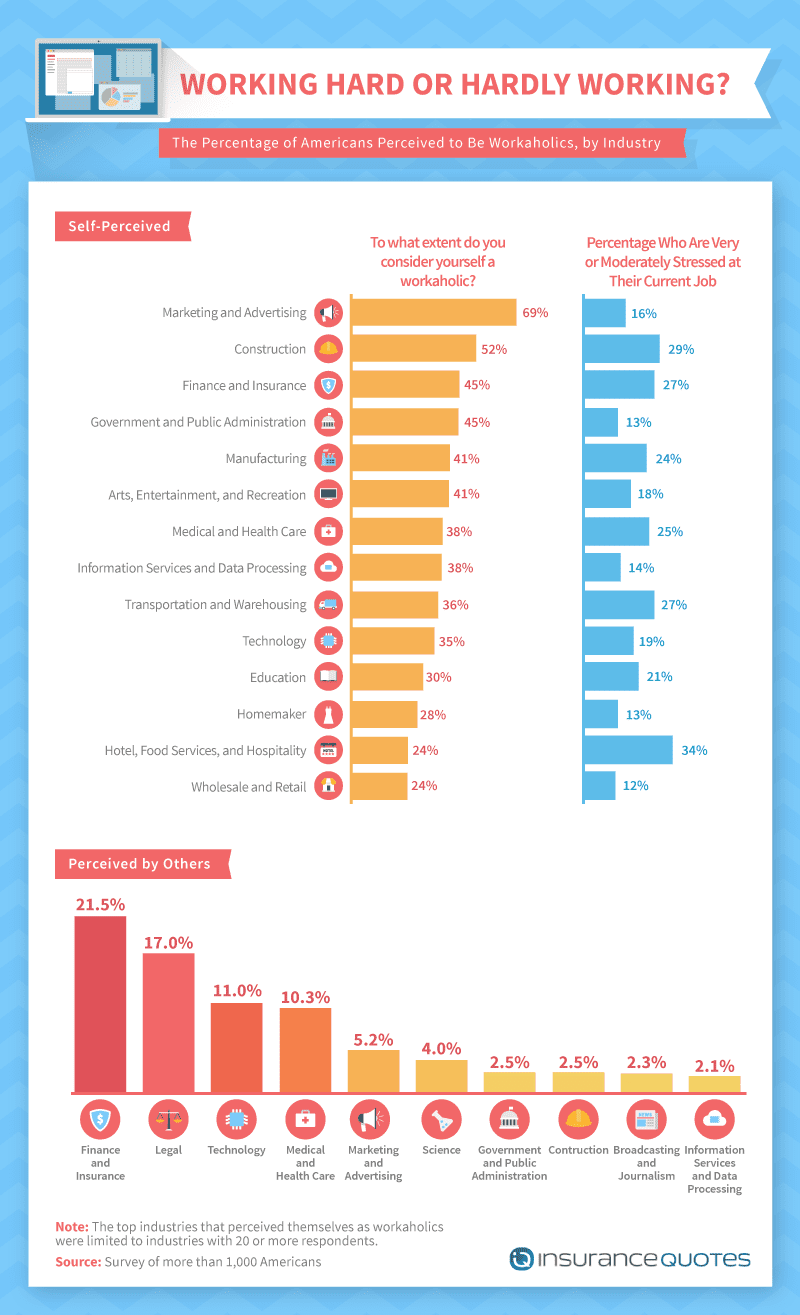
Which jobs are most likely to overwork their employees?
Americans working in marketing and finance may not always be seen as the busy bees they are by other professions, but 69 percent of marketers and advertisers were either somewhat or very comfortable identifying themselves as workaholics. Sixteen percent also admitted to being stressed at their current job. At least one study found extra hours and added stress Americans in marketing face may be a response to intense workloads and understaffed offices.
Like marketers, people working in construction, finance and insurance, and government and public administration positions were the most likely to consider themselves workaholics. Our survey also revealed over 21 percent of Americans believed finance and insurance appeared to be the most overworked industry overall, followed by the legal and technology industries.
If you’re looking for less stress (which can mean living a healthier life) and a job you can leave behind at the end of the day, the wholesale and retail industry was ranked No. 1 for having the least amount of self-proclaimed workaholics and stress. Of course, as job opportunities continue to shrink, the stress of working in retail may start to rise.
Happy to Work
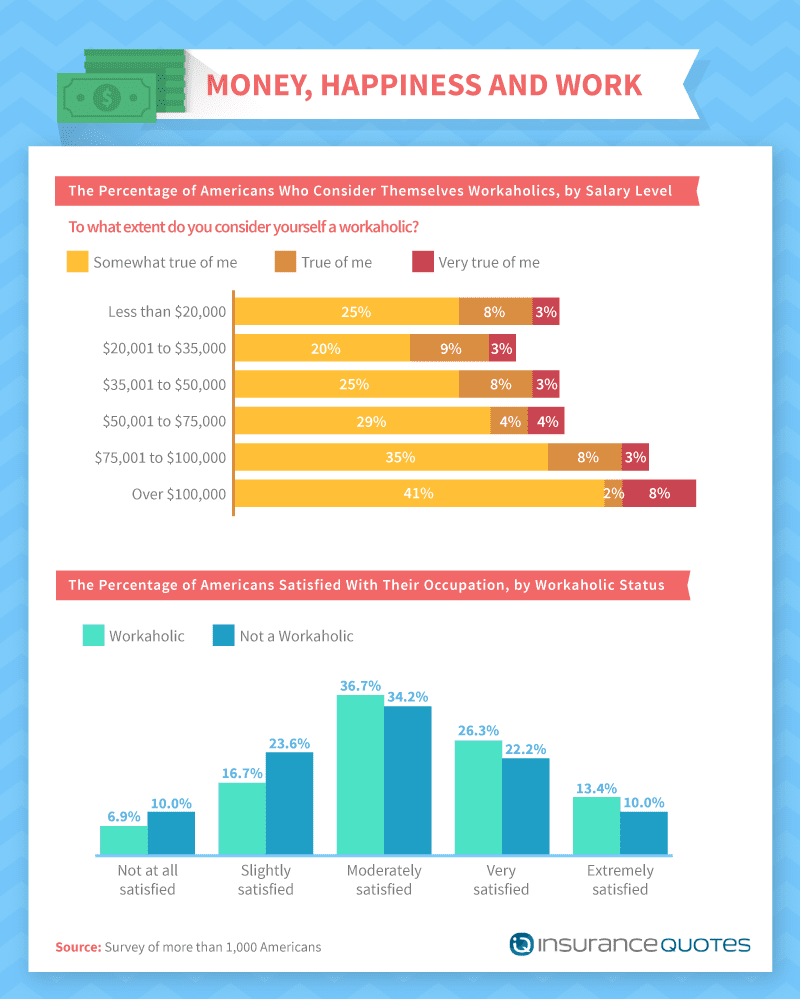
Our survey revealed Americans earning the greatest compensation were the most likely to consider themselves workaholics. This is a trend that might not be changing in the near future.
People earning less than $20,000 a year were more motivated to call themselves workaholics than those making up to $35,000 and were equally committed to the title as those earning between $35,001 and $50,000. More than half of Americans making over $100,000 a year considered themselves workaholics, a title that might not carry a negative connotation for everyone.
Nearly 37 percent of employed Americans who considered themselves workaholics were at least moderately satisfied with their current jobs. Less than 2 in 5 self-proclaimed workaholics were very or extremely satisfied with their occupations, compared to less than a third who didn’t consider themselves overworked.
The Downside to Too Much Work
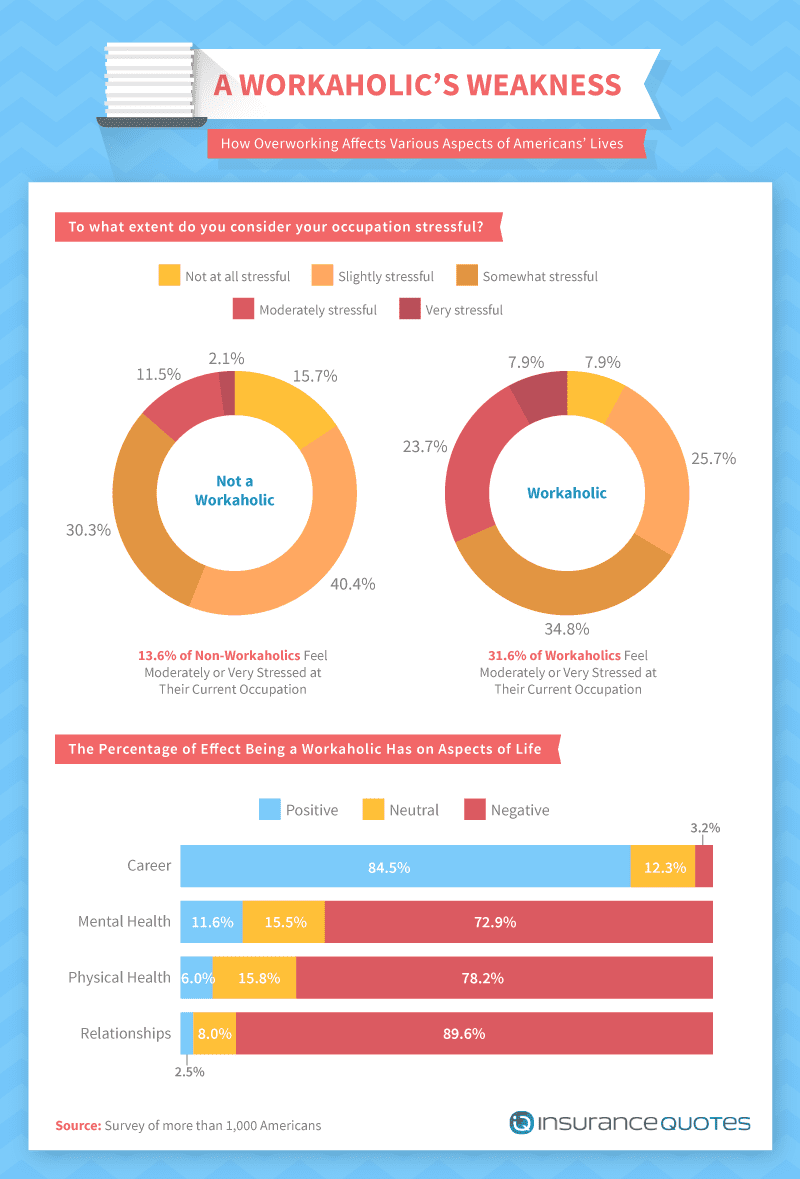
People who consider themselves workaholics may be happy with their jobs (and earning more money to make those extra hours feel rewarding), but it might not be better for their overall health.
Research has found people who work 70-hour workweeks aren’t any more productive than those who only work 56 hours, and they probably aren’t getting enough sleep at night either. Those extra hours can have physical and emotional ramifications, too. Americans working longer days may be more likely to experience depression and an increased risk for strokes, diabetes and cancer.
According to our survey, Americans who considered themselves workaholics were more than twice as likely as non-workaholics to feel moderately or very stressed about their jobs. While a vast majority of Americans believe working more can have a positive impact on their careers, they also recognize that longer days and less time off can have a negative impact on their health and relationships.
A Better Balance, a Better You
Americans may think they’re just simply spending a few extra hours at the office. However, a few hours here and there (as well as skipping vacations) can quickly start to add up. According to one study, Americans work 25 percent more (about 258 hours a year) than Europeans. While most people polled felt incentivized to work more for the sake of their careers, including advancement and compensation, they also recognized the toll those hours took on their bodies and relationships.
Taking regular breaks at work is essential for resetting your internal balance while keeping creativity at its max. Even just getting up and walking around the office can help make you feel more relaxed. Make sure you’re leaving time in your daily (and weekly) schedule for things you enjoy outside of work, and consider mapping out your day hour by hour if you think you aren’t spending enough time doing the things you enjoy most. If you can’t get away from your desk, even breathing techniques and stretching can help make you feel more relaxed at work.
Methodology
We surveyed over 1,000 Americans about what it means to be a workaholic. Fifty-two percent of respondents identified as men, 48 percent of respondents identified as women, and less than 1 percent identified as a gender not listed by our survey. Thirty-six percent of respondents considered themselves workaholics, while 57 percent did not consider themselves workaholics and 7 percent were neutral.
Sources
- https://www.theguardian.com/money/2015/sep/07/america-vacation-workaholic-culture-labor-day
- http://abcnews.go.com/US/story?id=93364&page=1
- http://www.businessinsider.com/psychological-benefits-of-being-single-2016-8
- http://www.chicagotribune.com/lifestyles/sc-spend-on-dating-family-0425-20170413-story.html
- https://www.costofwedding.com
- https://www.theguardian.com/sustainable-business/2016/jun/30/america-working-hours-minimum-wage-overworked
- http://www.npr.org/sections/thesalt/2015/03/05/390726886/were-not-taking-enough-lunch-breaks-why-thats-bad-for-business
- http://www.huffingtonpost.com/entry/check-work-email-hours-survey_us_55ddd168e4b0a40aa3ace672
- http://www.huffingtonpost.com/jill-l-ferguson/health-benefits-of-taking-a-vacation_b_9384466.html
- http://fortune.com/2017/05/23/vacation-time-americans-unused/
- http://www.chicagotribune.com/redeye/culture/ct-redeye-millennial-travel-trends-20170224-story.html
- http://www.adweek.com/brand-marketing/80-marketers-say-they-are-overloaded-and-understaffed-166339/
- https://www.theatlantic.com/business/archive/2017/04/the-silent-crisis-of-retail-employment/523428/
- https://www.fastcompany.com/3046429/the-highest-paying-jobs-of-the-future-will-eat-your-life
- http://www.healthline.com/health/working-too-much-health-effects#3
- https://www.bloomberg.com/news/articles/2016-10-18/americans-work-25-more-than-europeans-study-finds
- https://www.inc.com/the-muse/how-to-relax-at-work-without-leaving-desk.html
- http://www.businessinsider.com/why-you-should-never-eat-at-your-desk-again-2017-4
Fair Use Statement
You don’t need to overwork yourself to share this study. Feel free to share our findings on your site for any noncommercial use. We only ask that you ensure a link back to this page, so our contributors earn credit for their work.
